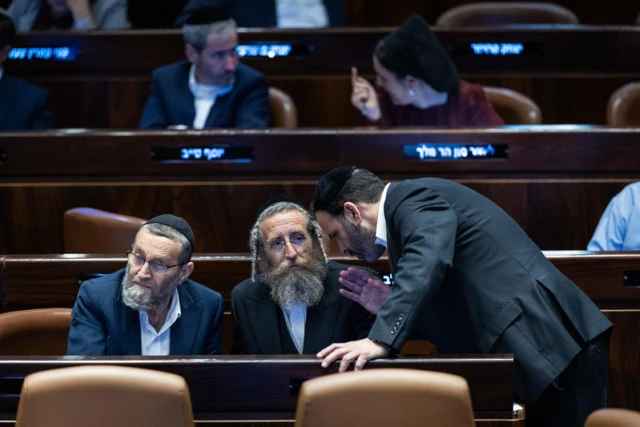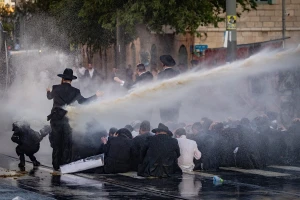Ultra-Orthodox parties quit coalition amid Haredi Draft law controversy, leaving gov't on brink of collapse
Ultra-Orthodox parties considering vote to collapse government

After the updated wording of the Haredi Draft Bill was presented to the ultra-Orthodox members of the coalition on Monday night, the two parties that make up the United Torah Judaism (UTJ) bloc announced their withdrawal from the coalition government.
Minister of Jerusalem and Jewish Tradition, Meir Porush, said the law “does not satisfy the demands and opinions of the rabbis” in announcing his party’s departure from the coalition.
The Sephardic ultra-Orthodox party Shas, which often acts in tandem with UTJ, did not announce its withdrawal on Monday evening.
Party leader Aryeh Deri is a longtime friend and political partner of Prime Minister Benjamin Netanyahu. It is believed that the two would engage in some attempt to reach an agreement, however, rabbis on both Sephardic and Ashkenazi councils called for the parties to leave the government.
Public broadcaster Kan News had published a story on Sunday, claiming that United Torah Judaism was planning to withdraw from the government this week, with Shas departing next week. That report came before the text of the Haredi Draft Bill was presented to the coalition parties.
The ultra-Orthodox parties also attacked the chairman of the Foreign Affairs and Defense Committee, Yuli Edelstein, who is responsible for drafting the new bill.
They said he had reneged on agreements reached on the eve of the attack in Iran, when the parties were close to leaving the government. At that time, Netanyahu convinced the parties to stay by sharing information about the imminent attacks on Iran with several party leaders.
Reports in Hebrew media state that Netanyahu even shared some classified information, which the party leaders did not have clearance for, in an attempt to prevent a collapse of the government while going to war with Iran.
On Monday, after the text of the bill was presented to the ultra-Orthodox parties, they presented a series of demands in order to stay in the government, including the cancellation of tens of thousands of conscription orders sent to yeshiva students and the renewal of yeshiva budgets, Kan News reported.
The parties also demanded that the sanctions on draft evaders be imposed on the individual, and not levied on the institution in which the evader is enrolled.
Initially, neither Shas nor United Torah Judaism were threatening to bring down the government, however, on Tuesday morning, the Orthodox Channel 7 reported that several ultra-Orthodox sources told the channel that UTJ members could participate in attempts to bring down the government.
"As long as a law is not submitted in the spirit of the agreements on the eve of the Iran war, we will consider supporting projects to bring down the government," a senior ultra-Orthodox source told Channel 7.
The source said they would ask the council of rabbis, called Gedolei Yisrael (great men of Israel), whether to participate in votes against the government.
Meanwhile, despite attacks on him from several members of the coalition, not just from ultra-Orthodox parties, Edelstein, who oversaw the writing of the Haredi Draft Bill, hit back at his critics, saying, “Either there will be a real conscription law – or there will be nothing.”
Edelstein has been the focus of many verbal and written attacks even by members of his own party, for his insistence that the law be a true conscription law.
“I don't intend to give up on the conscription law, and as I have always said, I will not have a draft law, but only a conscription law,” he was reported to have said in a report by the news outlet Israel Hayom.
Edelstein also rebutted claims by the ultra-Orthodox that he had violated agreements made the night before the attacks on Iran.
"The agreement between us was that they would not dismantle the government until the last plane returned from Tehran, but before that happened, the ultra-Orthodox had already started with threats and boycotts,” Edelstein stated.
While the ultra-Orthodox parties have expressed dissatisfaction with the increased number of Haredi men who will be eligible for the draft under the bill, many groups representing reserve soldiers have complained that the bill does not go far enough in requiring Haredi men to enlist.
They claim that they have borne an unbearable burden in the Iron Swords War, with many having returned for extended reserve combat duty on multiple occasions, while the number of new Haredi recruits remains very low.
The withdrawal of United Torah Judaism officially leaves the coalition with a bare majority of 61, including the Noam party of Avi Maoz, of which he is the only MK. Maoz previously resigned from a government deputy minister position over the failure to create a “Jewish national identity” hierarchy, per coalition agreements.
However, Maoz has continued to vote with the coalition. If he chooses to side with UTJ in leaving, the coalition would only have 60 out of 120 votes, provided Shas stays in the coalition.
Recently, the Religious Zionism party, headed by Finance Minister Bezalel Smotrich, and the Jewish Power party of National Security Minister Itamar Ben Gvir have also threatened to leave the coalition over the hostage-ceasefire proposal.
If the opposition parties are able to convince UTJ to vote for a bill to dissolve the government, and able to convince Maoz to join as well, that could lead to new elections in either October 2025, or March 2026, depending on whether Netanyahu agrees to dissolve the government immediately, or makes the law pass through second and third readings in the Knesset, in the hope of convincing opposition members not to vote for the bill.

The All Israel News Staff is a team of journalists in Israel.
You might also like to read this:










